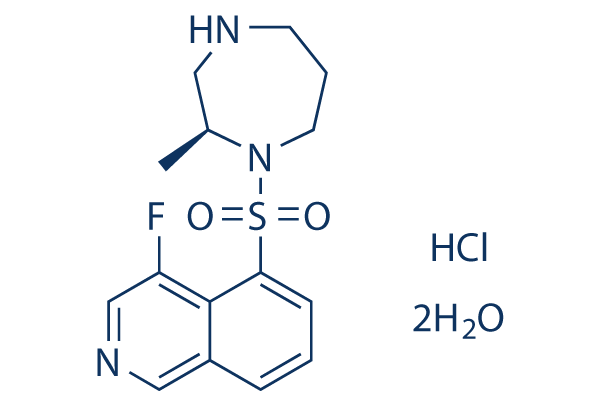research use only
Ripasudil hydrochloride dihydrate ROCK inhibitor
Cat.No.S7995

Chemical Structure
Molecular Weight: 395.88
Quality Control
Solubility
|
In vitro |
Water : 79 mg/mL
DMSO
: 26 mg/mL
(65.67 mM)
Ethanol : 5 mg/mL |
Molarity Calculator
|
In vivo |
|||||
In vivo Formulation Calculator (Clear solution)
Step 1: Enter information below (Recommended: An additional animal making an allowance for loss during the experiment)
Step 2: Enter the in vivo formulation (This is only the calculator, not formulation. Please contact us first if there is no in vivo formulation at the solubility Section.)
Calculation results:
Working concentration: mg/ml;
Method for preparing DMSO master liquid: mg drug pre-dissolved in μL DMSO ( Master liquid concentration mg/mL, Please contact us first if the concentration exceeds the DMSO solubility of the batch of drug. )
Method for preparing in vivo formulation: Take μL DMSO master liquid, next addμL PEG300, mix and clarify, next addμL Tween 80, mix and clarify, next add μL ddH2O, mix and clarify.
Method for preparing in vivo formulation: Take μL DMSO master liquid, next add μL Corn oil, mix and clarify.
Note: 1. Please make sure the liquid is clear before adding the next solvent.
2. Be sure to add the solvent(s) in order. You must ensure that the solution obtained, in the previous addition, is a clear solution before proceeding to add the next solvent. Physical methods such
as vortex, ultrasound or hot water bath can be used to aid dissolving.
Chemical Information, Storage & Stability
| Molecular Weight | 395.88 | Formula | C15H18FN3O2S.Cl H.2 H2 O |
Storage (From the date of receipt) | |
|---|---|---|---|---|---|
| CAS No. | 887375-67-9 | Download SDF | Storage of Stock Solutions |
|
|
| Synonyms | K-115 hydrochloride dihydrate | Smiles | CC1CNCCCN1S(=O)(=O)C2=CC=CC3=CN=CC(=C32)F.O.O.Cl | ||
Mechanism of Action
| Targets/IC50/Ki |
ROCK2
(Cell-free assay) 19 nM
ROCK1
(Cell-free assay) 51 nM
|
|---|---|
| In vitro |
In monkey trabecular meshwork (TM) cells, Ripasudil induces retraction and rounding of cell bodies as well as disruption of actin bundles. In Schlemm's canal endothelial (SCE) cells, Ripasudil significantly decreases transendothelial electrical resistance (TEER), increases the transendothelial flux of FITC-dextran, and disrupts cellular localization of ZO-1 expression. |
| Kinase Assay |
Kinase Inhibition Assay
|
|
ROCK 1 (0.75 ng/μL) and ROCK 2 (0.5 ng/μL) are incubated with various concentrations of K-115, Y-27632, or HA-1077 at 25 °C for 90 min in 50 mmol/L Tris-HCl buffer (pH 7.5) containing 100 mmol/L KCl, 10 mmol/L MgCl2, 0.1 mmol/L EGTA, 30 μmol/L Long S6 Kinase Substrate peptide, and 1 μmol/L ATP in a total volume of 40 μL. PKACα, PKC, and CaMKIIα are also incubated with various concentrations of K-115, Y-27632, or HA-1077. PKACα (0.0625 ng/μL) is incubated at 25 °C for 30 min in 40 mmol/L Tris-HCl buffer (pH 7.5) containing 20 mmol/L MgCl2, 1 mg/mL BSA, 5 μmol/L Kemptide peptide substrate, and 1 μmol/L ATP in a total volume of 40 μL. PKC (0.025 ng/μL) is incubated at 25 °C for 80 min in 20 mmol/L Tris-HCl buffer (pH 7.5) containing 20 mmol/L MgCl2, 0.4 mmol/L CaCl2, 0.1 mg/mL BSA, 0.25 mmol/L EGTA, 25 ng/mL phosphatidylserine, 2.5 ng/mL diacylglycerol, 0.0075% Triton-X-100, 25 μmol/L DTT, 10 μmol/L Neurogranin (28–43) peptide substrate, and 1 μmol/L ATP in a total volume of 40 μL. CaMKIIα (0.025 ng/μL) is incubated at 25 °C for 90 min in 50 mmol/L Tris-HCl buffer (pH 7.5) containing 10 mmol/L MgCl2, 2 mmol/L CaCl2, 0.04 mg/mL BSA, 16 μg/mL purified calmodulin from bovine testis, 500 μmol/L DTT, 50 μmol/L Autocamitide 2, and 1 μmol/L ATP in a total volume of 40 μL. After incubation, 40 μL of Kinase-Glo Luminescent Kinase Assay solution is added, and allowed to remain at 25 °C for 10 min, and Relative Light Units (RLU) are measured using a luminometer. The RLU without test compound is set as 100% (Control value), and that without enzyme and compound is set as 0% (Normal value). The reaction rate (% of control) is then calculated from the RLU with addition of each concentration of test compounds, and the 50% inhibitory concentrations (IC50) are determined by logistic regression analysis using SAS.
|
|
| In vivo |
In albino rabbits and monkeys, topical instillation of Ripasudil significantly reduces intraocular pressure (IOP) with maximum IOP reduction of 8.55 mmHg and 4.36 mmHg at 0.5 % and 0.4%, respectively. Ripasudil (1 mg/kg daily, p.o.) exerts a neuroprotective effect on retinal ganglion cell (RGC) after optic nerve crush (NC) by suppressing oxidative stress through pathways involving the Nox family in a mouse model. |
References |
|
Clinical Trial Information
(data from https://clinicaltrials.gov, updated on 2024-05-22)
| NCT Number | Recruitment | Conditions | Sponsor/Collaborators | Start Date | Phases |
|---|---|---|---|---|---|
| NCT04621136 | Completed | Retinopathy of Prematurity |
Kyushu University |
November 1 2020 | Phase 1|Phase 2 |
Tech Support
Tel: +1-832-582-8158 Ext:3
If you have any other enquiries, please leave a message.






































